FDA finally approves Sandoz's Neulasta biosimilar, but will Amgen put up a fight?

The FDA has approved Sandoz’s pegfilgrastim biosimilar, a cheaper version of Amgen’s long-lasting and big-selling white blood cell booster Neulasta.
Novartis’ generics and biosimilars division finally gained approval after refiling with the FDA in April this year, after a rejection in June 2016.
Following the approval Sandoz said it plans to launch the drug branded as Ziextenzo “as soon as possible this year”.
Ziextenzo has been on the European market since last year and is a granulocyte colony stimulating factor (GCSF) class drug.
Approval of Ziextenzo was based on a dossier of analytical, preclinical, and clinical research including data comparing Sandoz’s biosimilar with a US-sourced reference product, and an EU-sourced pegfilgrastim.
Sandoz already markets a short-acting GCSF biosimilar branded as Zarxio, a near-copy of Amgen’s originator drug, Neupogen (filgrastim).
Amgen’s US patent on Neulasta expired in October 2015 but a lack of direct competition has meant that it has remained on the market unchallenged.
As a result Neulasta was still Amgen’s second biggest selling drug last year, with the US accounting for nearly $3.9 billion in sales, with only $609 million coming from the rest of the world.
While the approval puts these sales at risk, past experience has shown that FDA approval of a biosimilar does not necessarily mean an immediate launch.
Originator companies, including Amgen, have proved to be adept at using legal arguments to block their launch.
Three years ago, the FDA approved Sandoz’s biosimilar of Amgen’s inflammatory diseases blockbuster Enbrel (etanercept), but it has not been launched because of a patent dispute.
Amgen’s original patent on Enbrel expired as long ago as 2012, but it has put up a thicket of other patents to protect it until 2028.
Whether Amgen, notorious in pharma for its aggressive legal department, will find some way to stave off Ziextenzo remains to be seen.
Biosimilars are near-copies of complex biologic drugs that are grown in cells and are approved using a rigorous series of tests to show they are as safe and effective as the original product.












